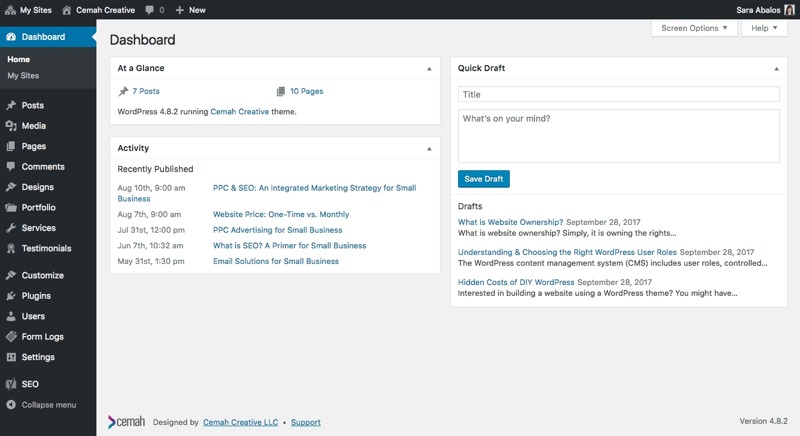What is website ownership? Simply, it is owning the rights to your small business website. However, website ownership is a tricky subject. There are many different aspects of a website, each with differing ownership rights. Some parts of your website are licensed instead of owned. Whether you actually own the other aspects depends on the company who develops the website and the contract you sign.
You don’t necessarily need ownership over your website. It depends on what makes sense for your business needs. However, it is important to know your rights, and what control you may have.
What You Legally Can & Cannot Own
 Aspects of Your Website You Don’t Actually Own
Aspects of Your Website You Don’t Actually Own
You may think your website is yours, but there are certain things you actually license instead. You should have the ability to continue to license these aspects, but you will never have ownership over them.
Domain Name – A domain name is your personal address to your website. Even if you register your own domain name, you do not actual own it. You are given exclusive use rights to this name as long as you renew it annually. If you miss a payment, someone else will have the ability to grab your name. You could potentially lose it forever.
Web Hosting Server – Web hosting is what connects your website to the Internet and makes it show up when someone goes to your domain name. When you purchase web hosting, you’re really renting space on a hosting server. It is possible to own your own web server, but the cost almost never makes sense for small businesses.

Content Management System (CMS) – The CMS is the part of your website allowing you to make changes to content, add pages, and control general aspects of your site. Not all websites have this, but most modern ones do. You could spend a lot of money to have a completely custom CMS created for your website with the developer handing over ownership. But for most small businesses, the investment isn’t worth it. Therefore, you generally license the rights to use the CMS your website is built on.
There are two main types of content management systems, open-sourced and proprietary. If an open-sourced CMS is used (such as WordPress or Drupal) you don’t own it, but you have the ability to switch hosts and providers. You can even move to a different website design company and keep your website intact. If a proprietary CMS is used (common with DIY solution companies), you are stuck with the company who created the website. If you want to move on to another provider, you will lose your design and code.
What You Have the Ability to Own
You are able to own certain aspects of your website. However, it doesn’t mean you do. Sometimes it depends on your contract with a website developer/company. Make sure who you work with is transparent about your ownership rights.
Written Content & Photography – You have ownership rights over content you write and photographs you take. This should always be the case, be weary if it isn’t. If you have a company write content for you, you should have the ability to gain ownership over the content upon payment. If you or your website designer use stock photography, you only have a license for those photos. Often, you cannot use the imagery elsewhere, unless you purchase an extended license from the stock photography company.
Website Design – The design of your website is originally owned by the person or company who creates it. They do have the ability to transfer ownership of the design to you, so check your contract or ask. It’s beneficial to own your design if you’d like to move to a different provider at some point. If your website is built on proprietary software, the company might not have the ability to give you ownership.
Website Code – The code is the language your website is built in and includes HTML, CSS, PHP and Javascript. Similar to website design, the company or developer can transfer ownership, but it is up to them. If you want to change companies and have your website look and function the same way, you’ll want ownership of the design and code. But again, if your website is built on proprietary software, this may not be possible. If this concerns you, ask before signing a contract.
Website Ownership vs. Control
 You might not have the ability to own any or all of your website, but it is a good idea to have some level of control over it. For small businesses, website ownership might not matter as much as control. Being able to make changes to content, update blog posts, and adjust contact information is important. The ability to move your website to a different provider and keep the look and function can also be a plus.
You might not have the ability to own any or all of your website, but it is a good idea to have some level of control over it. For small businesses, website ownership might not matter as much as control. Being able to make changes to content, update blog posts, and adjust contact information is important. The ability to move your website to a different provider and keep the look and function can also be a plus.
Think of your website as another store front or office for your business. You may rent the space, but you want to have the ability to control what goes inside. It also helps to have a reliable landlord (website company) who can help keep the building in good shape and make adjustments when necessary.
What is Website Ownership to Cemah Creative?
As a company, we believe a business should have as much control over their website as they want or can have. We have some clients who have us fully manage their website. Others, we give admin controls to the content management system so they can update blogs and content. After a year of service, we transfer full ownership rights of the design and code to all our clients. This gives them the ability to move to a different provider if they’d like. We believe this is the right thing to do.
So Who Actually Owns My Small Business Website?
In a nutshell, lots of different entities do. A domain registrar owns your domain name and a web host owns the server your website is on. The person who created your website owns the design and code, but can give you ownership rights. You own your content.
For a small business, ownership isn’t a necessity in all cases. Control may not even be something you need if you have a trusted website manager. However, it is always a good idea to know your rights. If you want ownership and control, talk to your web company. Make sure to always understand your website ownership situation.